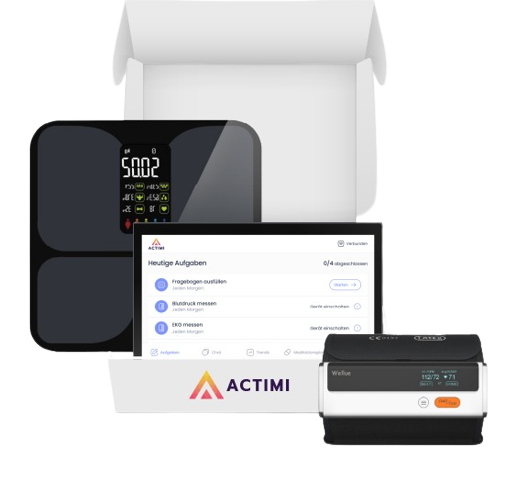Start-up Actimi GmbH
Real-time telemonitoring of heart failure
Improved quality of life for patients and lower costs for health insurers: these are the advantages of telemonitoring patients with advanced heart failure. The Stuttgart-based start-up Actimi offers an all-in-one platform for those who treat and those who suffer from the disease.
Shortness of breath, water retention and weight gain – these are the first symptoms of heart failure or cardiac insufficiency, in which the organs are no longer supplied with sufficient oxygen and nutrients. Heart failure is a clinical picture that can develop as a result of various pre-existing conditions, such as coronary heart disease, high blood pressure, heart valve disease or even diabetes mellitus. Therapy consists of medication, an implantable pacemaker (cardiac resynchronisation therapy, CRT) in the advanced stages to eliminate the asynchronous contraction of the heart or an implantable defibrillator (ICD) to prevent cardiac arrhythmias. The number of patients treated for heart failure in German hospitals rose steadily up to 2019. And even though there was a COVID-19-related decrease in hospitalisations for heart failure in 2020, it is still the single most common diagnosis among in inpatients.1
Telemonitoring for heart failure was included in the German Uniform Assessment Standard (EBM) on 1st January 2022 in order to improve the care for advanced heart failure patients. This inclusion means that this kind of care can be billed to the statutory health insurance funds by the treating physician and a telemedical centre.
Box with tablet and external devices
 The Actimi box contains everything a patient needs for monitoring heart failure. © Actimi GmbH
The Actimi box contains everything a patient needs for monitoring heart failure. © Actimi GmbHDr. Maximilian Weiß and his co-founders also recognised the need for advanced technology in this area when they set up Actimi GmbH in mid-2021. The company offers a telemedical centre service that can be reimbursed by the statutory health insurance funds. "The Actimi box is a patient-friendly tool that provides everything the patient needs for monitoring," explains Weiß. It contains a tablet with a built-in SIM card that can only use the CE-rated monitoring app in so-called kiosk mode. The box also comes with a bluetooth ECG, blood pressure monitor and body scales, which are already integrated into the app. This ensures that the doctor receives the data whenever a measurement is taken. "Of course, we have additional functionalities, such as a chat facility to speak to the doctor, a medication planner, an alarm that reminds you when to do the measurements and care groups in which you can include family members, for example. But these are all optional," says Weiß, who has a doctoral degree in patient compliance. According to the 2021 German Heart Report, most patients with heart failure are 65 or older. The start-up therefore makes a point of being extremely patient-friendly. "We want to address all patients, because even though these days many people of all ages can cope with technical devices, there is still a large segment of society that cannot easily download an app and make the necessary connections," says Weiß.
 Two of the Actimi founders (from left to right): Julian Charisius and Dr. Maximilian Weiß. © Actimi GmbH
Two of the Actimi founders (from left to right): Julian Charisius and Dr. Maximilian Weiß. © Actimi GmbHTraining included
The start-up Actimi, which Weiß founded with his cousin Julian Charisius and his uncle Dietrich Charisius, provides cardiologists in private practices with the necessary infrastructure for telemonitoring. If the inclusion criteria required for billing via the statutory health insurance system are fulfilled (see box ‘Indications’), the doctor scans the code on the Actimi box to assign it to the patient. An introductory session to the operating technique is then held in the practice before the patient takes the box home. "Training material is provided within the app in the form of video, text and images in case the patient forgets how it works," adds the founder. In addition to cardiologists in private practice, medical care centres affiliated to clinics and clinics with outpatient authorisations can also participate in telemonitoring. Another advantage for participating doctors is that the start-up also deals with the logistics, such as repairing or replacing equipment.
Indications
- Heart failure with symptoms such as shortness of breath or arrhythmia during physical exertion, e.g., climbing stairs (NYHA stage II). Or with symptoms during low-intensity exertion, such as walking (NYHA stage III).
- A greatly reduced volume of blood ejected from the ventricle (ejection fraction < 40 percent).
- Patients with an implanted pacemaker (ICD, CRT-P, CRT-D) or who have been hospitalised for heart failure in the past 12 months.
Advantages for all involved
With such a complex symptomatology as heart failure, the measurements that can be done independently and the contact with medical staff improves the patient’s quality of life. "When you have a chronic disease, you always live with the uncertainty that it might get worse. It is no trivial matter when you notice your symptoms deteriorating. As a result, if your heartbeat and breathing start getting worse, you tend to stay at home more and get less exercise. As a result, water builds up in the legs and hospitalisation becomes more likely," explains Weiß. This kind of deterioration is called decompensation, and it significantly increases the mortality rate of those with the disease. Thanks to regular self-measurement and medical staff checking the numbers, patients feel better cared for, deterioration is recognised faster and quality of life increases. Patients’ degree of willingness to cooperate (patient compliance) is also extremely important, also when applying for subsequent reimbursement through the health insurance funds.
The resulting decrease in the number of hospitalisations also has a cost impact for the health insurance funds. The medical costs for treating heart failure in Germany amounted to 7.4 billion euros in 2020, of which 3.2 billion euros were incurred in hospitals (illness costs, German Federal Statistical Office). Telemonitoring therefore has an enormous potential benefit for the health economy.
Monitoring with the Actimi box
This is what monitoring with the Actimi box looks like.
© Actimi GmbH
Focussed on data protection
Of course, data protection is also a high priority at Actimi. The system is built in such a way that the vital data of those being monitored is stored, but no assignment data is available at the company. "Actimi does not collect names, dates of birth, etc.; the only thing collected is the tablet serial number and associated data. Assignment to patient data is made behind a firewall at the doctor's practice," says Weiß, emphasising the importance of data protection. "In addition, all data is hosted on ISO-certified German servers." But the start-up wants to do even better, so Actimi is working with the Fraunhofer Institute for Industrial Engineering IAO, the University of Stuttgart and the University of Kassel on a joint project called TESTER (DigiTalE SelbsTvERmessung selbstbestimmt gestalten) to research and develop a privacy assistant. The aim is to help patients determine how their data is handled. The project is funded by the German Federal Ministry of Education and Research (BMBF).
Monitoring for other diseases
The Actimi box, in which the tablet, ECG, blood pressure monitor, body scales and software are approved as a medical device, is scheduled for application in cardiology in 2023. "But in addition to the roll-out of the finished product for heart failure, we are of course planning further developments, such as a data-analysis module. Currently, we help doctors as regards threshold values and notification should these values be exceeded. But of course, AI helps here by recognising at an early stage when the patient’s symptoms are getting worse. It goes without saying that the ultimate decision is always down to doctors, but we try to provide the best support we can," says Weiß. In the future, Weiß also foresees extending the monitoring procedure to other diseases such as diabetes, COPD or chronic kidney disease. First, however, the company founders are concentrating on a successful roll-out for treating heart failure.